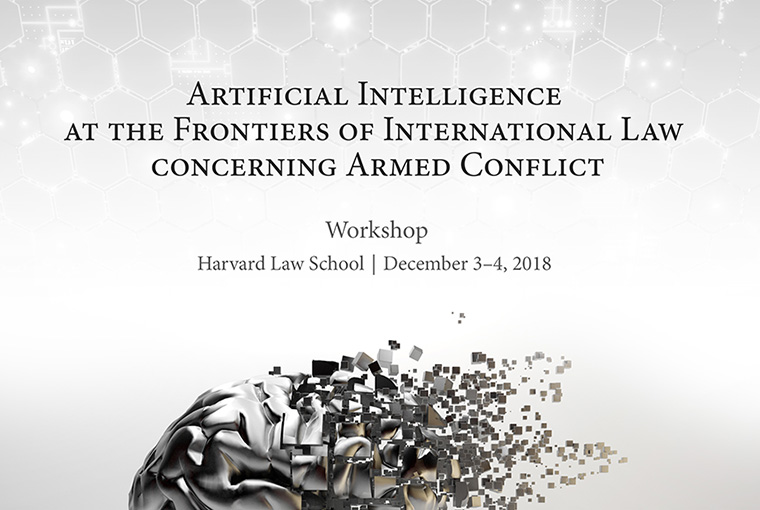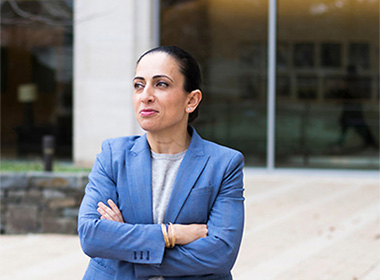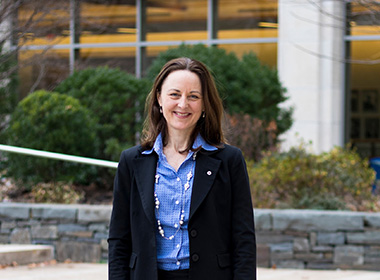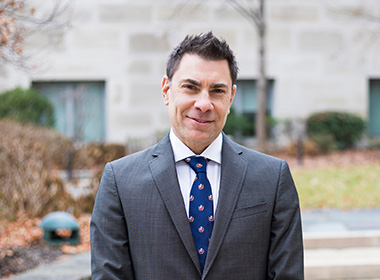Legal, tech experts look at impact of artificial intelligence on international law, armed conflict

Experts on law and technology gathered in Cambridge, Massachusetts, from Dec. 3-4 for a conference that explored how artificial intelligence is shaping international law and armed conflict.
The workshop was hosted by Harvard Law School’s Program on International Law and Armed Conflict in conjunction with the Stockton Center for International Law at U.S. Naval War College and the International Committee of the Red Cross’ Regional Delegation for the United States and Canada.
The event, “Artificial Intelligence at the Frontiers of International Law Concerning Armed Conflict,” included representatives from academia and government in addition to international and nongovernmental organizations.
The event started off with “boot camps” for the participants. The technology experts got a primer on international humanitarian law, and the lawyers received a crash course on artificial intelligence.
 Naz K. Modirzadeh, professor of practice at Harvard Law School and the director of the Harvard Law School Program on International Law and Armed Conflict
Naz K. Modirzadeh, professor of practice at Harvard Law School and the director of the Harvard Law School Program on International Law and Armed Conflict(Lorin Granger/Harvard University)
“Armed conflicts continue to be transformed by new and emerging technologies, not least by artificial intelligence,” said Naz K. Modirzadeh, Harvard Law School professor of practice and director of the Program on International Law and Armed Conflict.
“To anticipate and address wide-ranging legal opportunities and challenges, it is imperative to deepen our understanding of the complex technical dimensions,” she said.
Modirzadeh said her program was pleased to host a workshop aimed at forming a bridge between two very different fields: artificial intelligence and international humanitarian law.
 Nicole Hogg, legal advisor and head of legal department at the ICRC Regional Delegation for the United States and Canada
Nicole Hogg, legal advisor and head of legal department at the ICRC Regional Delegation for the United States and Canada(Lorin Granger/Harvard University)
Nicole Hogg, legal adviser and head of the legal department for the International Committee of the Red Cross delegation, said the two-day discussion was useful and thought-provoking.
“Bringing together technical and legal experts helped us analyze these complex issues from different perspectives and gave us a lot to contemplate going forward,” Hogg said.
James Kraska, chair of the Stockton Center, said he was thankful to the “superb group” for its contributions.
 James Kraska, chair of the Stockton Center
James Kraska, chair of the Stockton Center(Lorin Granger/Harvard University)
“This valuable workshop brought together a diverse, interdisciplinary crowd to advance our understanding of the most prominent technological advancement in relation to armed conflict in a generation,” Kraska said.
Articles based on the conference are expected in coming months, an official said.
The Stockton Center plans to publish pieces in a future issue of its International Law Studies journal. The International Committee of the Red Cross will publish analysis on its Humanitarian Law & Policy blog.
About the Stockton Center: Named for Charles H. Stockton, a former Naval War College president and author of the first code of the law of naval warfare, the Stockton Center is the world's premier research institute for national security and international law.
The faculty of the Stockton Center includes members from all U.S. military branches as well as foreign military officers from the United Kingdom and Japan.
The center produces cutting-edge legal research, writing and analysis regarding current issues of public international law, oceans law and maritime security to inform and advise military and leaders at all levels of the U.S. government.
